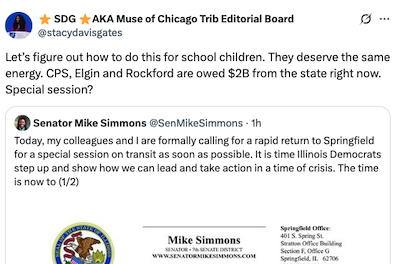|
Unclear on the concept (except for the coverage angle) (Updated x2)
Wednesday, Aug 20, 2025 - Posted by Rich Miller * Congressional candidate calls for special session within 10 days even though nobody has anything ready to actually vote on once they get to town…
It’s easy to say “the time is now,” when you aren’t involved in either crafting a bill or shepherding it through both chambers to reach the required three-fifths super majorities (and, notice that the Senate’s chief transit bill sponsor isn’t demanding an immediate return). This stuff doesn’t happen by magic. And, by the way, the Senate’s bill, which Sen. Fine didn’t vote for, has no chance in the House. * Senate President Harmon talked earlier this month about a special session…
Not to mention that if the GA does come back early, the Chicago Teachers Union will be demanding action on their fiscal agenda, which will only intensify the Chicago-bashing. But, this empty call will probably give these three a little press bump, which is what it’s probably all about. …Adding… The RTA is considering moving some money around to delay any cuts to the CTA, according to the Tribune…
Keep in mind that the transit systems are receiving an unexpected $150 million in new sales tax revenue this calendar year, and that will increase next year. …Adding… CTU is already on board with the fantasy session…  The governor talked about this today…
|
| « NEWER POSTS | PREVIOUS POSTS » |

















